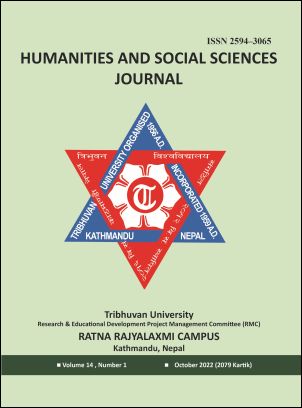Manifestation of Sexist Ideology in Nepali Folk Songs
DOI:
https://doi.org/10.3126/hssj.v14i1.57989Keywords:
feminist, folk song, objectification, patriarchal, sexist ideologyAbstract
The objective of this research article is to examine and analyse the representative folk songs intonated by two Nepalese vocal maestros, Kumar Basnet and Ram Thapa. Feministic theoretical approach has been used to expose how patriarchal ideology belittles women as inferior sex. For that purpose, the perspective of sexist ideology has been employed. Thirteen different songs are taken as the primary texts in this research. Definitely, a number of researches have been carried out on Nepali folk songs by the foreign as well as home scholars basically from the descriptive approach. Aesthetic perspective has been widely used employing the literary parameters of simile, metaphor, symbol and the like. However, the critical analysis of the rustic folk songs from the perspective of sexist ideology is virtually sporadic and in the low ebb. This research tends to seek answers to the three prominent questions. Firstly, what sexist ideology means. Secondly, why pernicious images that are unfriendly to women reoccur in these folk songs. Thirdly, how the selected songs of these two folk maestros manifest sexism based on men/women dichotomy of the patriarchal social regime.




